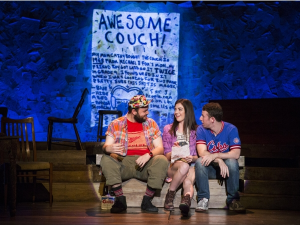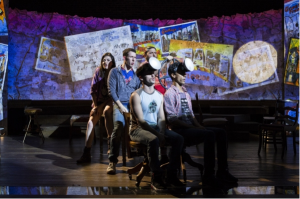A picture might be worth a thousand words, but a note can tell a thousand stories — at least that is what Davy teaches us in the musical Found. The main character Davy is based on the real-life story of Davy Rothbart who created the magazine Found. By combining the book by Hunter Bell and Lee Overtree with the music and lyrics of Eli Bolin, the story of Davy’s life becomes a very quirky and enjoyable musical that can change how a person looks at a lost note or letter.
Davy (Nick Blaemire) is a young man who finds a note on his windshield after a very bad day. With the discovery of this note comes the inspiration to create a magazine that he names Found — a collection of notes and letters that people have left behind. These notes range from children’s notes (“Dear Mom, summer camp is not fun anymore, everyone is dying”) to lovers (“You bring the paper bag, I’ll bring the handcuffs… let’s party”) to notes reflecting on one’s life (“With a baby in my dream all my life now, I’ll be questioning what it would be like with a child to call my own… just maybe this is a sign that I’m not meant to have a child…”). With each note comes an unknown story that can be interpreted and read in different ways.
With the help of his lifelong friend Mikey D (Daniel Everidge) and his roommate Denise (Barrett Wilbert Weed), the magazine becomes extremely successful. Together they bring the magazine on tour, reading the notes to audiences across the United States. However, the plan to keep the original messages is challenged when Davy falls in love with a producer, Kate (Betsy Morgan). Davy loses himself in fame and fortune, which could potentially change the magazine forever.
With a 10-person cast, many of the actors successfully played multiple characters without confusing the audience. The brick walls and wooden stage created a comfortable atmosphere where the audience could laugh and emotionally connect with thousands of untold stories in the notes.
With the simple plot of a young man needing to venture out into the world before he realizes the girl back home and his old life was what he wanted all along — this play would appear to be very unoriginal. However, this play proves to be unique and entertaining by having this very basic story line propelled by interweaving the original notes published in Found into the script. The notes are used as the inner thoughts of characters or as side commentary on the scene that is unfolding. Sometimes, entire songs will be composed of a single note. For instance, while on tour, Davy sings the song “Pi Shop” — a note that is written by a mathlete and his friends about the wonders of Pi. Or even the heartbreaking love song, “Barf Bag Breakup,” which is based off of a note that was written on the back of a white paper barf bag. The use of notes to reveal inner thoughts, commentary and songs creates a connection between the audience, making them relate to the messages on the notes and think about all the thoughts they never wrote down.
The connection between the audience and the notes could not have been successful without the use of projection. With various handwritings, crossed-out mistakes and irregular spelling, projection designer Darrel Maloney creates a visual representation of the notes that are found and displays them for the entire audience. These notes, projected on the walls of the set, create a realistic image of what these notes might look like when they were found.
Although the pop-rock music songs were catchy and enjoyable, they were often times overshadowed by the bizarre and heartfelt notes that the audience sees and hears. Although the playwrights go off on tangents with additional songs that do not add to the story arch or create scenes that reenact why a note was written, these tangents bring more laughs to the entire show.
So maybe the next time you walk down the block and see a crumbled up note, read it, and see what story you find within the mystery of someone else’s thoughts.
Found ran through Nov. 9 at the Atlantic Theater Company's Linda Gross Theater (336 West 20th St.). For more information, visit http://atlantictheater.org/playevents/found/.




